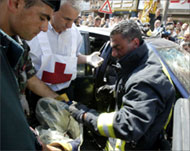Arrests follow Beirut assassination
A number of Syrian workers have been arraigned for questioning in connection with the assassination of the former secretary-general of the Lebanese Communist Party, George Hawi.

Hawi was killed when a bomb ripped through his car in Beirut on Tuesday, witnesses and security sources said.
They said Hawi died instantly in the blast on Tuesday morning in the Wata Musaitbi neighbourhood of the capital.
Ghassan bin Jiddo, director of Aljazeera’s office in Lebanon, said the car exploded in front of Hawi’s house.
Witness Rami Abu Dargham told Reuters: “The car kept going and we then saw the driver screaming and he jumped out of the window. We rushed to the car and saw Hawi in the passenger seat with his guts out.”
The bomb was apparently placed under the passenger seat of Hawi’s Mercedes and was detonated by remote-control, security sources said.
Hawi’s driver was injured in the explosion, bin Jiddo added.
Aljazeera reported that opposition forces repeated their demand for the resignation of President Emile Lahoud, blaming him for the assassination of Hawi in his capacity as head of the security system.
|
“Israel is eliminating all those who have harmed it during the past two decades, while we are getting ourselves busy in accusing each other” Nasir Qandil, former MP |
Many civil defence and security force officers arrived at the scene and cordoned off the area. A team of FBI investigators also went to the site, Aljazeera learned.
Opposition figure Walid Jumblatt said the killing of Hawi, whom he described as a nationalist leader, sent a message to all Lebanese.
“Some sides want to cause a state of instability in Lebanon by foiling the success of the elections in northern Lebanon,” said Jumblatt, the leader of the Progressive Socialist Party.
Second killing
Tuesday’s attack was the second killing of an anti-Syrian figure in Beirut this month.
Newspaper columnist Samir Kassir was killed on 2 June when a similar explosion destroyed his car.
Hawi’s killing comes two days after the end of Lebanon’s parliamentary elections which were won by an anti-Syrian alliance led by Saad al-Hariri, son of former prime minister Rafiq al-Hariri, who was also assassinated, on 14 February.
Explanation
Nasir Qandil, a former member of parliament, told Aljazeera that Hawi had an important role in organising resistance against Israel and that was the reason for his slaying.
 |
|
Hawi died instantly in the blast |
“All those who have harmed Israel are now being eliminated amid a state of disorder and series of accusations and political divisions,” he said.
“Al-Hariri’s assassination was meant to be transferred into an outbreak, aiming to punish Syria for its positions … Samir Kassir was assassinated as he had played major roles in revealing the Zionist projects in the area,” Qandil said.
“Israel is eliminating all those who have harmed it during the past two decades, while we are getting ourselves busy in accusing each other,” Qandil said.
Opposing view
But former Lebanese president Amin Jmayil gave Aljazeera a different view, saying Hawi paid for his involvement in protests that led Syria to withdraw its troops and intelligence services from Lebanon.
|
“Hawi was an active figure of 14 March which has led to the Syrian army withdrawal from Lebanon… Some of the security authorities, who have previously caused disorder in the country, have not given up yet” Amin Jmayil, |
“Hawi was an active figure of 14 March (when major demonstrations took place in downtown Beirut), which has led to the Syrian army withdrawal from Lebanon. We still demand ending the Syrian intelligence presence in the country,” he said.
“Hawi’s assassination also aims to cause instability in the country. It has nothing to do with the elections and their results,” he added.
He said remnants of the security forces are attempting to create instability.
“Some of the security authorities, who have previously caused disorder in the country, have not given up yet.”